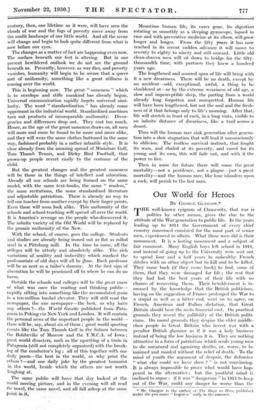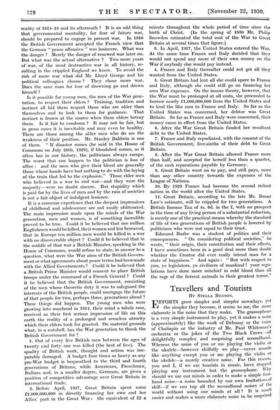Our World for Heroes
By GEORGE GLASGOW.* THE well-known epigram of Clausewitz, that war is politics by other means, gives the clue to the attitude of the War generation to public life. In the years leading up to 1914 the Government of every chief country concerned consisted for the most part of senior men, experienced in affairs. What those men did is their monument. It is a lasting monument and a subject of fair comment. Many English boys left school in 1914, and instead of going up to the University were sent out to spend four and a half years in unhealthy French ditches with no other object but to kill and to be killed. They came back (if they came back) to find, some of them, that they were damaged for life ; the rest that they had lost the best years of their life with no chance of recovering them. Their bewilderment is in- creased by the knowledge that the British politicians, having on the suggestion of France prolonged the War to a stupid as well as a bitter end, went on to agree, on French, American and Italian dictation, that Great Britain should bear the main financial cost. On practical grounds they resent the gullibility of the British politi- cians. On moral grounds they despise the elder middle- class people in Great Britain who invest war with a peculiar British glamOur as if it was a holy business instead of being the low business it is. They see nothing attractive in a form of patriotism which sends young men to die unnatural and agonizing deaths, or, worse, to be 'maimed and mauled without the relief of death. To the mind of youth the argument of despair, the defensive " what else could we have done ? " is not convincing. It is always impossible to prove what would have hap- pened in the alternative ; but the youthful mind is inclined to argue : if it was " dangerous " in 1914 to keep out of the War, could any danger be worse than the • Mr. Glasgow is the author of The baps as Hero, published under the pen.natne " Logistes " early in the slimmer. reality of 1914-18 and its aftermath ? It is an odd thing that governmental mentality, for fear of future war, should be prepared to engage in present war. In 1916 the British Government accepted the French view that the German " peace offensive " was insincere. What was the danger ? Merely the danger of renewed war later on. But what was the actual alternative ? Two more years of war, of the most destructive war in all history, re- sulting in the crippled England we know. To avoid the risk of more war what did Mr. Lloyd George and his political colleagues choose ? They chose more war. Does the sane man for fear of drowning go and drown himself ?
Is it possible for young men, the men of the War gene- ration, to respect their elders ? Training, tradition and instinct all bid them respect those who are older than themselves and to look to them for guidance. That instinct is frozen at the source when those elders betray them. Is it fair to condemn ? It may not be fair, but in gross cases it is inevitable and may even be healthy. There are those among the older men who do see the weakness of their position. Mr. Stanley Baldwin is one of them. " If disaster comes (he said in the House of Commons on July 26th, 1929), if bloodshed comes, as it often has in our history, the politicians always escape. The worst that can happen to the politician is loss of office ; and the men who give their blood are generally those whose hands have had nothing to do with the laying of the train that led to the explosion." Those elder men who believed in a war to end war—and they were the majority—were no doubt sincere. But stupidity which is paid for by the lives of men and by the ruin of societies is not a fair object of indulgent lenience.
It is a common experience that the deepest impressions of childhood and adolescence are not easily obliterated. The main impression made upon the minds of the War generation, men and women, is of something incredible proved to be true. Could it be believed that one million Englishmen would be killed, their women and kin bereaved, that in Europe ten million men would be killed in a war with no discoverable object ? Could it be believed that in the middle of that war a British Minister, speaking in the House of Commons, would refuse to state, in answer to a question, what were the War aims of the British Govern- ment or what agreements about peace terms had been made with the Allied Governments? Could it be believed that a British Prime Minister would consent to place British troops under the command of a French General ? Could it be believed that the British Government, consisting of the men whose theoretic duty it was to safeguard the interests of the British people, could mortgage the future of that people for two, perhaps three, generations ahead ? These things did happen. The young men who were growing into manhood in 1914, their mind a tabula rasa, received as their first serious impression of life on this earth the reality of a prolonged and senseless atrocity which their elders took for granted. On material grounds what, in a nutshell, has the War generation to thank the British Government for ?
1. Out of every, five British men between the ages of twenty and forty one was killed (the best of five). The quality of British work, thought and action was irre- parably damaged. A budget four times as heavy as any pre-War budget is bequeathed to the third and fourth generations of Britons, while Americans, Frenchmen, Italians and, in a smaller degree, Germans, arc given a position of competitive advantage over Great Britain in international trade.
2. Before April, 1917, Great Britain spent some £2,000,000,000 in directly financing her own and her Allies' part in the Great War : the equivalent of £2 a minute throughout the whole period of time since the birth of Christ. (In the spring of 1930 Mr. Philip Snowden estimated the total cost of the War to Great Britain at several times that figure.)
3. In April, 1917, the United States entered the War, At the same time France and Italy decided that they would not spend any more of their own money on the War if anybody else would pay instead.
4. France and Italy thereafter could not get all they wanted from the United States.
5. Great Britain had lent all she could spare to France and Italy, although she could still go on financing her own War expenses. On the insane theory, however, that the War must be prolonged at all costs, she proceeded to borrow nearly £1,000,000,000 from the United States and to lend the like sum to France and Italy. So far as the United States was concerned, her debtor was Great Britain. So far as France and Italy were concerned, their money came in effect from the United States.
6. After the War Great Britain funded her resultant debt to the United States.
7. France and Italy repudiated, with the consent of the British Government, five-sixths of their debt to Great Britain.
8. After the War Great Britain allowed France more than half, and accepted for herself less than a quarter, of the cash reparations payable by Germany.
9. Great Britain went on to pay, and still pays, more than any other country towards the expenses of the League of Nations.
10. By 1929 France had become the second richest nation in the world after the United States.
11. Great Britain, according to the late Mr. Bonar Law's estimate, will be crippled for two generations. A British Income Tax of 4s. 6d. in the £, with no prospect in the time of any living person of a substantial reduction, is merely one of the practical means whereby the standard of life of two generations of British people is lowered by politicians who were not equal to their trust.
Edmund Burke was a student of politics and their consequences. " On considering political societies," he wrote, " their origin, their constitution and their effects, I have sometimes been in a good deal more than doubt whether the Creator did ever really intend man for a state of happiness." And again : " But with respect to you, ye legislators, ye civilizers of mankind your regu_- lations have done more mischief in cold blood than all the rage of the fiercest animals in their greatest terror."



















































































 Previous page
Previous page